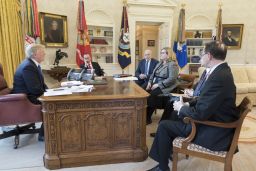President Donald Trump was more instrumental than previously known in scrapping plans to move the FBI headquarters out of Washington to the DC suburbs, according to newly released internal government emails.

The decision could have financial benefits for the President, whose own hotel is located a block away, critics say.
The documents were released Thursday by House Democrats in a letter to General Services Administrator Emily Murphy that suggests she misled Congress about the President’s involvement.
“New documents provided to the Oversight Committee indicate that President Trump met personally with you, the FBI, and White House officials on January 24, 2018, where he was directly involved with the decision to abandon the long-term relocation plan and instead move ahead with the more expensive proposal to construct a new building on the same site, and thereby prevent Trump Hotel competitors from acquiring the land,” states the letter by Maryland Rep. Elijah Cummings, the top Democrat on the House Oversight and Government Reform Committee, and other senior Democrats.
White House spokeswoman Sarah Sanders said that the “House Democrats have it all wrong.”
“The President wanted to save the government money and also the FBI leadership did not want to move its headquarters,” she told CNN in a statement.
A financial analysis conducted by the GSA’s inspector general, however, concluded that constructing a new FBI building in downtown DC “would actually be more costly” than relocating the bureau.
In a statement Thursday afternoon, GSA argued that the emails Democrats cited were taken out of context.
“As previously testified by GSA and the FBI, the leadership team at the FBI made the decision to keep its headquarters at the current Pennsylvania Avenue location. A number of emails referenced in today’s congressional letter are taken out of context and refer to the project’s funding approach, not the location decision,” agency spokeswoman Pamela Dixon said. “Suggestions that those emails indicate presidential involvement in the location decision are inaccurate. GSA stands by its testimony and the cost analysis proposed in the joint revised plan submitted to Congress in February.”
The days following the White House meeting included efforts to make the decision to keep the FBI in Washington official, specifically referencing Trump’s wishes.
Just one day after the meeting with Trump in the Oval Office, GSA’s acting chief of staff, Brennan Hart, sent an email to Joseph Lai, a special assistant to the President, to emphasize the decision had been made not to relocate the FBI headquarters.
Days later, GSA’s acting general counsel, Jack St. John, suggested the need to get “something in writing” from the FBI and Justice Department that solidified what had been agreed upon in the meeting with Trump.
Hart responded in an email, “Ideally, I think it would first recap the oval meeting with what POTUS directed everyone to do then ask Emily [Murphy] to execute POTUS’s orders.”
On January 28, Hart also sent an email to officials in the Office of Legislative Affairs discussing Trump’s role that said, “GSA is going to hold our ground on funding source and that it is a demolition/new construction per the President’s instructions.”
Questions about Murphy’s testimony
The documents obtained by House Democrats are a preview of the kinds of oversight Democrats might escalate if they win the House majority in November.
Democrats have “serious concerns” about the move on the FBI plan to “replace it with a more costly plan to keep the current location, demolish the existing building, and construct a new facility on the same site,” the letter states.
The have also raised questions about why the GSA chief was not more forthcoming with Congress about the White House’s role. In April, Murphy did not disclose she’d met with the President about the project when asked by Rep. Mike Quigley, an Illinois Democrat, during a congressional hearing if the President or anyone at the White House was involved in the discussions about the future of the FBI building.
The General Services Administration’s inspector general later said Murphy’s testimony had been “incomplete.”
“We found that Administrator Murphy’s testimony before the House Appropriations Committee, Financial Services and General Government Subcommittee on April 17, 2018, was incomplete and may have left the misleading impression that she had no discussions with the President or senior White House officials in the decision-making process about the project,” the IG said in a report in August.
Democrats accuse Murphy in their letter of concealing valuable information from Congress.
“Your meetings with the White House came to light only after direct evidence emerged, including a photograph of you meeting with President Trump in the Oval Office, along with other White House, Justice Department, and FBI officials,” the Democrats wrote in the letter Thursday.

Democrats on the committee argue that Trump had a clear interest in the FBI property being developed before he was President, but after he became President and was not allowed to invest in the project, his interest became ensuring no other developer could buy the property, convert it and compete with the Trump hotel.
“Many years before becoming President, Donald Trump expressed interest in the FBI headquarters moving out of Washington, D.C. so he could acquire the land on Pennsylvania Avenue and redevelop the property, which is directly across the street from the Trump International Hotel. However, after he was sworn in as President—and became ineligible as a federal employee to obtain the property—he reportedly became ‘dead opposed’ to the government selling the property, which would have allowed commercial developers to compete directly with the Trump Hotel,” Cummings and his colleagues wrote.
CNN’s Greg Wallace contributed to this report.



